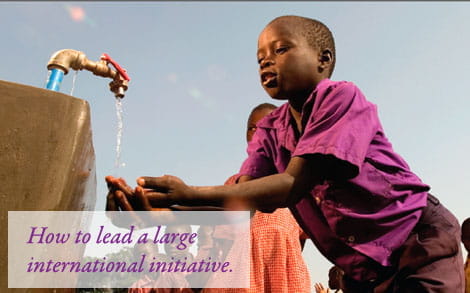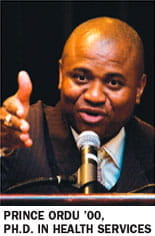How to lead a large international initiative

Prince Ordu was only 19 years old when he left his family in River State, Nigeria, to pursue his college education in the United States. Though Ordu would eventually make the U.S. his permanent home, his lifelong goal of bringing clean water to Nigeria remained steadfast. Following his graduation from Walden University’s PhD in Health Services program, Ordu put his plan into practice. The college professor and healthcare consultant’s clean water initiative, which is supported, in part, by volunteers affiliated with the Etche America Foundation, earned him Walden’s 2009 Outstanding Alumni Award. Ordu credits his Boy Scout experience in Nigeria for teaching him to give back—a value he has since passed on to his four children who regularly volunteer in their hometown of Atlanta. Ordu offers the following tips for tackling large international social change missions.

Solidify Your Goals. What do you want to achieve? What challenges will you face? You must be very clear in setting your goals and be ready to invest emotional as well as financial resources to achieve those goals. I learned a valuable lesson from my doctoral thesis research that involved surveying healthcare practices in five Nigerian hospitals: You must have the time to visit the country and be willing to champion the project yourself.
Look Before You Leap. You need to develop an action plan and outline the resources you will need to achieve the desired results. Then you must begin building support among your own network, including government and foundation contacts abroad.
Be Aware of Cultural Differences. Even though I grew up in Nigeria, I still faced cultural challenges. You cannot enter a community with your plan in hand and say, “You don’t have water, let me supply it.” In Africa, you must talk with the elders, the youth, and the community leaders before you begin a project. My ability to understand the community-building process and to meet with all the players and hear their opinions helped move the project forward.
Know How to Raise Funds. As a young student in Nigeria, I saw firsthand how politicians raised funds. I traveled with them and saw how they won community support. When you have a good cause and can make a strong presentation, people will support your agenda, particularly when it makes a positive contribution to humanity. I was committed to use my own funds to get the project started. I later received government and foundation support and am still looking for long-term funding to maintain the project.
Relinquish Control. Life is a learning process and all human beings encounter challenges. To overcome those challenges together, we must learn to respect the opinions of others and to give up control when needed. The world in which we live belongs to every one of us, and we all have something to contribute. We must overcome our differences as individuals, as a society, and within organizations to reach our common goal. —Nancy Grund
Learn more about Dr. Prince Ordu's clean water initiative.


